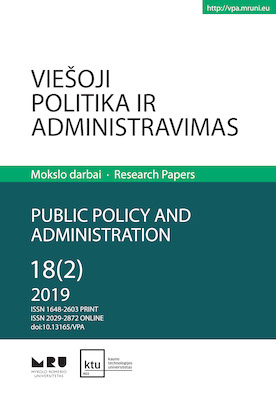Public Governance efficiency and macroeconomic stability: examining convergence of social and political determinants
Public Governance efficiency and macroeconomic stability: examining convergence of social and political determinants
Author(s): Agota Giedrė Raišienė, Tetyana Vasilyeva, Oleksii Lyulyov, Tetyana PimonenkoSubject(s): National Economy, Governance, Public Administration
Published by: Mykolas Romeris University
Keywords: Public Governance efficiency; macroeconomic stability; GMM model, Fishburne’s method;
Summary/Abstract: The purpose of this article is to propose the integrated index of Public Governance efficiency based on the Fishburne’s method, considering the impact’s power and direction of the different sub-indexes (Worldwide Government Indicators) on macroeconomic stability and eliminating the issue of multicollinearity. The object of the study was 11 European countries that had two common features: 1) in the political sphere, during 1990–1992 the countries started the political transformation process by refusing the monopoly of the communistic regime; 2) in the economic sphere, the countries experienced transformation from planned to market economy. Based on these criteria, the following countries were selected: Lithuania, Latvia, Poland, Bulgaria, Croatia, Romania, Armenia, Belorussia, Georgia, Moldova, and Ukraine. The research findings proved a connection between the political and social determinants and the macroeconomic stability for the all the countries. Moreover, the research results confirmed the existence of a cycle of social and political conflict, which depends on inter-relation of Public Governance and the society, where the efficiency of Public Governance cannot be achieved without the support from the society, and the society cannot cooperate with non-effective Public Governance.
Journal: Viešoji politika ir administravimas
- Issue Year: 18/2019
- Issue No: 2
- Page Range: 241-255
- Page Count: 15
- Language: English

